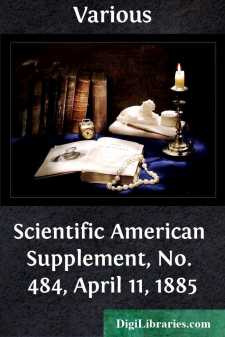Categories
- Antiques & Collectibles 13
- Architecture 36
- Art 48
- Bibles 22
- Biography & Autobiography 813
- Body, Mind & Spirit 142
- Business & Economics 28
- Children's Books 15
- Children's Fiction 12
- Computers 4
- Cooking 94
- Crafts & Hobbies 4
- Drama 346
- Education 46
- Family & Relationships 57
- Fiction 11828
- Games 19
- Gardening 17
- Health & Fitness 34
- History 1377
- House & Home 1
- Humor 147
- Juvenile Fiction 1873
- Juvenile Nonfiction 202
- Language Arts & Disciplines 88
- Law 16
- Literary Collections 686
- Literary Criticism 179
- Mathematics 13
- Medical 41
- Music 40
- Nature 179
- Non-Classifiable 1768
- Performing Arts 7
- Periodicals 1453
- Philosophy 64
- Photography 2
- Poetry 896
- Political Science 203
- Psychology 42
- Reference 154
- Religion 513
- Science 126
- Self-Help 84
- Social Science 81
- Sports & Recreation 34
- Study Aids 3
- Technology & Engineering 59
- Transportation 23
- Travel 463
- True Crime 29
The Atlantic Monthly, Volume 06, No. 36, October, 1860
by: Various
Categories:
Description:
Excerpt
SOME OF THE HAUNTS OF BURNS.
BY A TOURIST WITHOUT IMAGINATION OR ENTHUSIASM.
We left Carlisle at a little past eleven, and within the half-hour were at Gretna Green. Thence we rushed onward into Scotland through a flat and dreary tract of country, consisting mainly of desert and bog, where probably the moss-troopers were accustomed to take refuge after their raids into England. Anon, however, the hills hove themselves up to view, occasionally attaining a height which might almost be called mountainous. In about two hours we reached Dumfries, and alighted at the station there.
Chill as the Scottish summer is reputed to be, we found it an awfully hot day, not a whit less so than the day before; but we sturdily adventured through the burning sunshine up into the town, inquiring our way to the residence of Burns. The street leading from the station is called Shakspeare Street; and at its farther extremity we read "Burns Street" on a corner house,—the avenue thus designated having been formerly known as "Mill Hole Brae." It is a vile lane, paved with small, hard stones from side to side, and bordered by cottages or mean houses of white-washed stone, joining one to another along the whole length of the street. With not a tree, of course, or a blade of grass between the paving-stones, the narrow lane was as hot as Tophet, and reeked with a genuine Scotch odor, being infested with unwashed children, and altogether in a state of chronic filth; although some women seemed to be hopelessly scrubbing the thresholds of their wretched dwellings. I never saw an outskirt of a town less fit for a poet's residence, or in which it would be more miserable for any man of cleanly predilections to spend his days.
We asked for Burns's dwelling; and a woman pointed across the street to a two-story house, built of stone, and white-washed, like its neighbors, but perhaps of a little more respectable aspect than most of them, though I hesitate in saying so. It was not a separate structure, but under the same continuous roof with the next. There was an inscription on the door, bearing no reference to Burns, but indicating that the house was now occupied by a ragged or industrial school. On knocking, we were instantly admitted by a servant-girl, who smiled intelligently when we told our errand, and showed us into a low and very plain parlor, not more than twelve or fifteen feet square.
A young woman, who seemed to be a teacher in the school, soon appeared, and told us that this had been Burns's usual sitting-room, and that he had written many of his songs here.
She then led us up a narrow staircase into a little bed-chamber over the parlor. Connecting with it, there is a very small room, or windowed closet, which Burns used as a study; and the bedchamber itself was the one where he slept in his latter life-time, and in which he died at last. Altogether, it is an exceedingly unsuitable place for a pastoral and rural poet to live or die in,—even more unsatisfactory than Shakspeare's house, which has a certain homely picturesqueness that contrasts favorably with the suburban sordidness of the abode before us....












